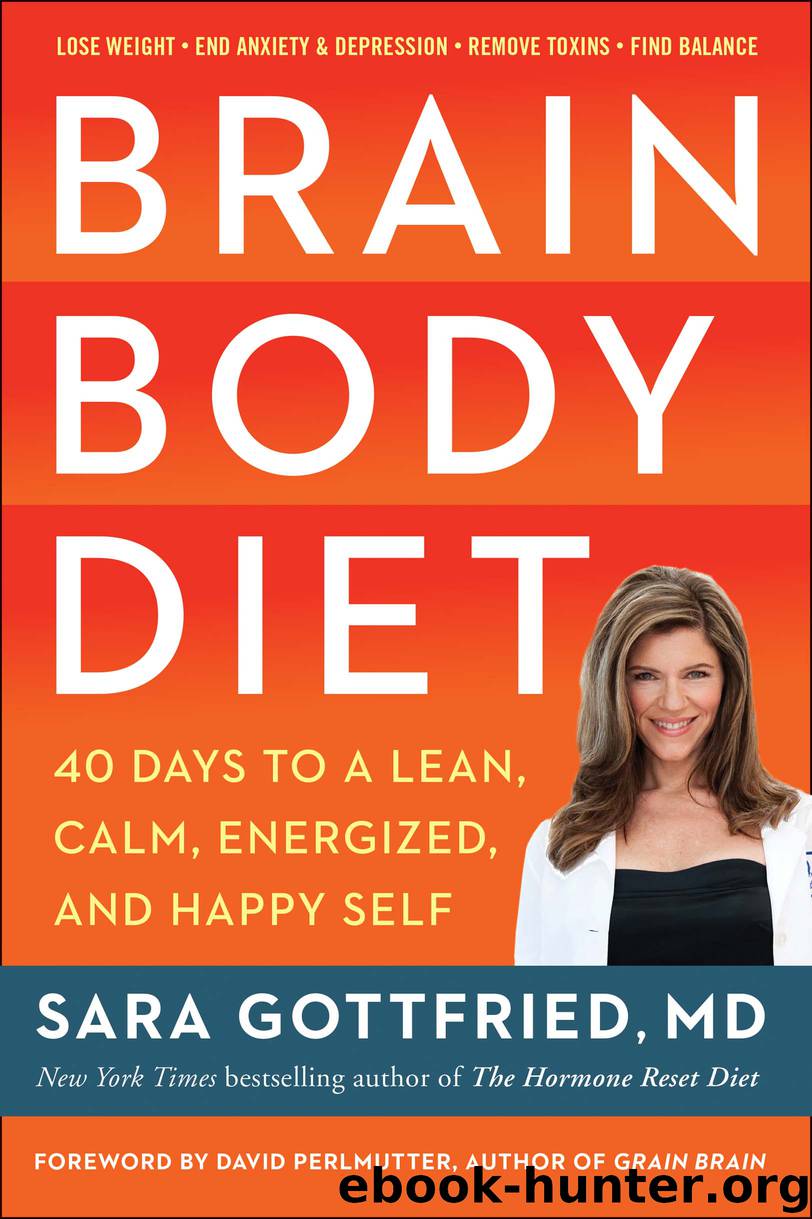Brain Body Diet by Sara Gottfried M.D

Author:Sara Gottfried, M.D.
Language: eng
Format: epub
Publisher: HarperCollins
Published: 2019-01-06T16:00:00+00:00
INTERPRETATION
If you said yes to five or more questions, you may have an issue with the pleasure trap (i.e., reward deficiency syndrome). Seven or more, and it’s highly probable that you have a problem. While the symptoms of reward deficiency and altered dopamine activity overlap with other brain chemical imbalances, if you follow the entire Basic Protocol in this chapter, you will feel better.
Woman on a Tear
Marni idles high, meaning she experiences an uncomfortable high-speed churning of her nervous system while at rest. She lives alone in Mill Valley, California, a wealthy enclave within the Bay Area. She is forty-one, right-handed, linear, detail-oriented, logical, ambitious, hard-driving, and successful, and she has always excelled at numbers and math, meaning that she is probably dominant in the left hemisphere of her brain. She works in finance as an investment banker, a stressful job. She carries a high level of tension in her psyche and body and gets a weekly massage to try to settle down.
When she comes home after a long work day, Marni loves to unwind with a glass of wine. Drinking wine, though, gives her night sweats and ruins her sleep, so when she turned forty, she decided to drink only on the weekends, believing it would be a simple change. Lately though, she drinks on other days too—work has been so demanding that she needs the relief. What began as a mild interest in a drink now feels more like an overwhelming desire.
“I’m drinking a bottle every night. Isn’t wine good for you?” she asks. Maybe for some people, since wine in moderation lowers the risk of cardiovascular disease, but not necessarily for Marni if it robs her of quality sleep and gives her a hangover (clear signs of harm to the brain/liver connection). Behind the scenes, alcohol not only kills brain and liver cells but detrimentally affects the microbiome. Alcohol can be destructive to a strong, confident, and self-possessed woman when it causes sleep debt and damage to the brain. (Remember: the blood-brain barrier thins out as you age, so toxins like alcohol hit you harder.) In chapter 2, alcohol was identified as a neurotoxin, but alcohol is also a carcinogen that increases a woman’s risk of breast cancer, even at a modest dose of three servings per week.2
Marni exercises to blow off steam: barre class six days a week, running on the weekends, and spin class as often as possible. She is nursing a stress fracture from running, but she doesn’t want to slow down. “It’s addictive,” she tells me, “and I feel so good afterward, almost human.” Oh, except for the pain in her foot.
Every day, Marni has a bar of chocolate. It started as a single square to perk herself up in the afternoon, but she gradually developed the habit of eating the entire bar. “Don’t ask me to give it up. I can’t live without my chocolate. It’s the only carb that I allow myself. I exercise so I can eat the way I want.
Download
This site does not store any files on its server. We only index and link to content provided by other sites. Please contact the content providers to delete copyright contents if any and email us, we'll remove relevant links or contents immediately.
Adulting by Kelly Williams Brown(3687)
Figure Drawing for Artists by Steve Huston(2807)
Draw Your Day by Samantha Dion Baker(2717)
Drawing Cutting Edge Anatomy by Christopher Hart(2689)
Drawing Shortcuts: Developing Quick Drawing Skills Using Today's Technology by Leggitt Jim(2537)
Make Comics Like the Pros by Greg Pak(2432)
Draw to Win: A Crash Course on How to Lead, Sell, and Innovate With Your Visual Mind by Dan Roam(2282)
How Proust Can Change Your Life by Alain De Botton(2269)
Day by Elie Wiesel(2252)
0041152001443424520 .pdf by Unknown(2230)
How The Mind Works by Steven Pinker(2228)
Rapid Viz: A New Method for the Rapid Visualization of Ideas by Kurt Hanks & Larry Belliston(2207)
Modern Cartooning by Christopher Hart(2195)
Poses for Artists Volume 2 - Standing Poses: An essential reference for figure drawing and the human form. (Inspiring Art and Artists) by Justin Martin(2150)
Draw-A-Saurus by James Silvani(2112)
Learn Drawing Quickly by Sharon Finmark(2099)
Tattoo Art by Doralba Picerno(2089)
Poses for Artists - Dynamic & Sitting: An essential reference for figure drawing and the human form (Inspiring Art and Artists Book 1) by Justin R Martin(2067)
Drawing and Painting Birds by Tim Wootton(2008)
